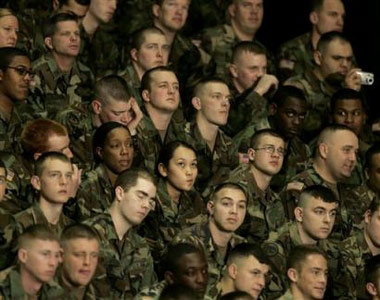|
Study: US army stretched to breaking point
(AP)
Updated: 2006-01-25 07:25
Stretched by frequent troop rotations to Iraq and Afghanistan, the US Army has become a "thin green line" that could snap unless relief comes soon, according to a study for the Pentagon.
Andrew Krepinevich, a retired Army officer who wrote the report under a Pentagon contract, concluded that the Army cannot sustain the pace of troop deployments to Iraq long enough to break the back of the insurgency. He also suggested that the Pentagon's decision, announced in December, to begin reducing the force in Iraq this year was driven in part by a realization that the Army was overextended.

Army troops from Fort Riley, Kan., listen to President Bush deliver a speech about the war on terror during the Landon Lecture at Kansas State University Monday, Jan. 23, 2006 in Manhattan, Kan. [AP] |
As evidence, Krepinevich points to the Army's 2005 recruiting slump — missing its recruiting goal for the first time since 1999 — and its decision to offer much bigger enlistment bonuses and other incentives.
"You really begin to wonder just how much stress and strain there is on the Army, how much longer it can continue," he said in an interview. He added that the Army is still a highly effective fighting force and is implementing a plan that will expand the number of combat brigades available for rotations to Iraq and Afghanistan.
The 136-page report represents a more sobering picture of the Army's condition than military officials offer in public. While not released publicly, a copy of the report was provided in response to an Associated Press inquiry.
Illustrating his level of concern about strain on the Army, Krepinevich titled one of his report's chapters, "The Thin Green Line."
He wrote that the Army is "in a race against time" to adjust to the demands of war "or risk `breaking' the force in the form of a catastrophic decline" in recruitment and re-enlistment.
Col. Lewis Boone, spokesman for Army Forces Command, which is responsible for providing troops to war commanders, said it would be "a very extreme characterization" to call the Army broken. He said his organization has been able to fulfill every request for troops that it has received from field commanders.
The Krepinevich assessment is the latest in the debate over whether the wars in Iraq and Afghanistan have worn out the Army, how the strains can be eased and whether the U.S. military is too burdened to defeat other threats.
Rep. John Murtha, the Pennsylvania Democrat and Vietnam veteran, created a political storm last fall when he called for an early exit from Iraq, arguing that the Army was "broken, worn out" and fueling the insurgency by its mere presence. Administration officials have hotly contested that view.
George Joulwan, a retired four-star Army general and former NATO commander, agrees the Army is stretched thin.
"Whether they're broken or not, I think I would say if we don't change the way we're doing business, they're in danger of being fractured and broken, and I would agree with that," Joulwan told CNN last month.
|